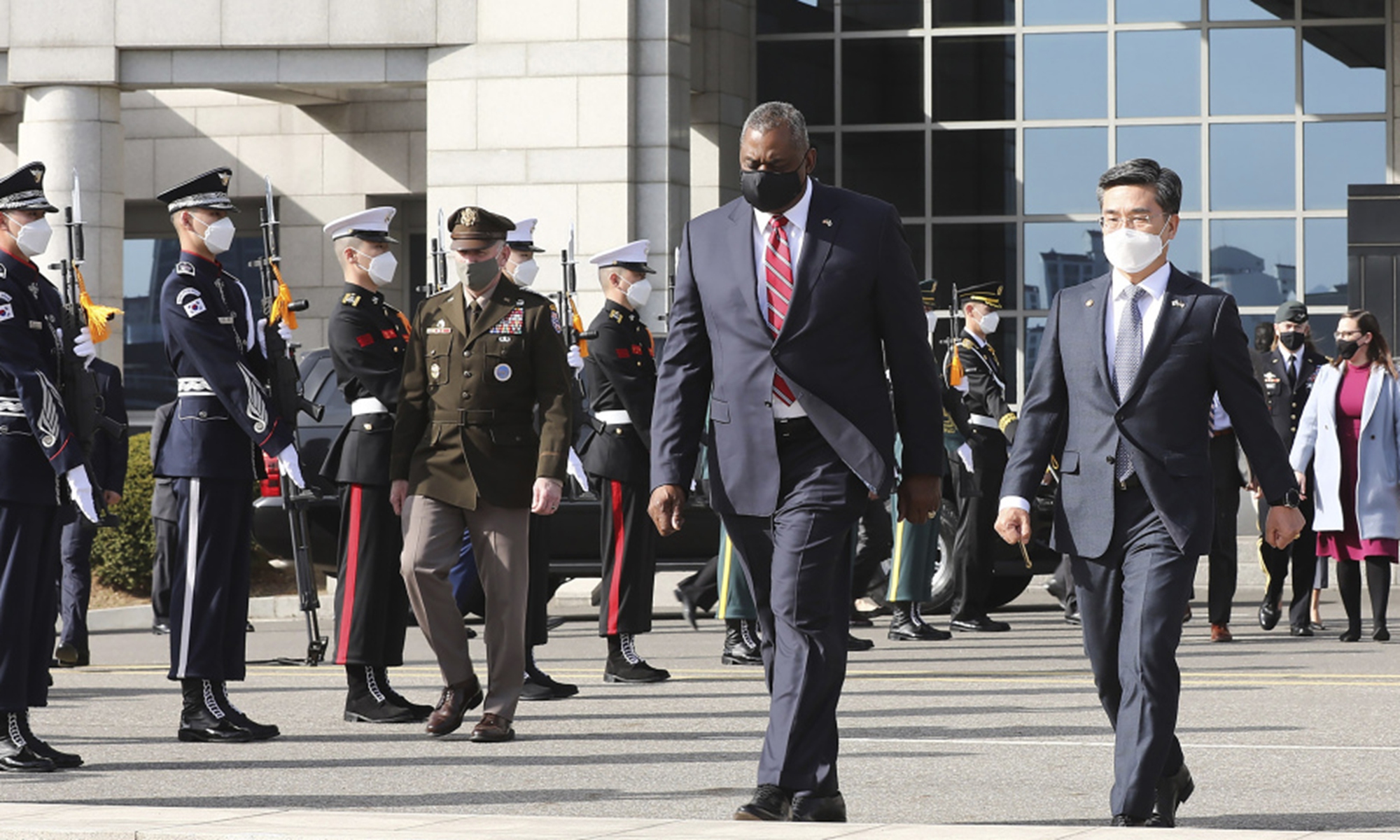China-free US-SK joint statement shows Seoul's rationality, pragmatic consideration of geopolitical interests: analysts

A US Defense Secretary Lloyd Austin inspects an honor guard with South Korean Defense Minister Suh Wook (right) during a welcome ceremony at the Defense Ministry in Seoul, on Wednesday. Photo: AP
South Korea's downplaying of the "China threat" narrative which has been peddled by two visiting senior US envoys, while opting for nuclear and ballistic missile issues in the Korean Peninsula as priority in the two country's joint statement, shows Seoul's rationality in dealing with Washington, analysts said.
The statement was released Thursday following a meeting between South Korean Foreign Minister Chung Eui-yong and Minister of National Defense Suh Wook, with US Secretary of State Antony Blinken and Secretary of Defense Lloyd Austin in Seoul. And throughout the document, China was not mentioned - in contrast to what Chinese observers deemed the "most acrimonious" joint statement between Washington and Tokyo that explicitly promoted a political agenda of containing China, released a day earlier.
Instead, South Korea and the US said in the statement that the Korean Peninsula nuclear and ballistic missile issues are a priority for the alliance, and reaffirmed a shared commitment to address these issues, according to the full text published by South Korea's Yonhap News Agency on Thursday.
The statement also highlighted carrying on efforts toward the transition of the wartime Operational Control and deepening cooperation across a range of areas including trade, health, nuclear non-proliferation, nuclear energy, COVID-19, combating the climate crisis, space and cybersecurity.
Da Zhigang, chief expert at the Northeast Asian Strategic Studies Institute, told the Global Times on Thursday that he welcomes South Korea' rational stance shown in the document, and believes it would contribute to the continuity of the benign interaction between Beijing and Seoul amid the COVID-19 pandemic since last year.
Different than Japan's stance, Seoul refraining from openly provoking China is out of consideration of its own geopolitical interests, which also benefits the Korean people, Zheng Jiyong, director of the Center for Korean Studies at Fudan University in Shanghai, told the Global Times on Thursday.
"It is not hard to understand such differences between Seoul and Tokyo." Zheng explained that South Korea has a deeper reliance on China in many fields including economic recovery, coronavirus battle and Korean Peninsula nuclear issues, which do not allow it to overly tilt toward either side between China and the US.
However, analysts said their optimism remained cautious, since US Secretary of Defense Austin did talk ill about China in Seoul right after arriving in Seoul on Wednesday afternoon during exchanges with his South Korean counterpart, although Wook did not mirror Austin's remarks.
Unlike the previous Trump administration that would keep bullying its allies to the corner until it gets what it wants, Biden's team knows how to play the long game, Da noted.
Talks on sensitive topics, especially in the defense sector such as the additional deployment of a THAAD battery in South Korea, could have taken place, and one may only find the outcomes of these under-the-table talks from the US envoys' releases after they return to the US, analysts said.
Right after the part on prioritizing nuclear and ballistic missile issues in the Korean Peninsula, the statement read that "The Ministers and Secretaries affirmed the importance of South Korea-US-Japan trilateral cooperation and pledged to continue promoting mutually beneficial, forward-looking cooperation to promote peace, security and prosperity in the region."
Reading between the lines, Da said, the US may elevate Japan's say over the issue while downplaying China's, which is a shift from a traditional six-party talks mechanism, or even from the four-way mechanism of China, North Korea, the US and South Korea. And such a political agenda clearly aims to dwarf China's weight in the game.
The long-existing anti-America sentiments in the South Korean society were also seen on Thursday with people disapproving the country joining the US' chariot and serving its geopolitical goals.
Holding signs with Blinken's profile and his mouth red-crossed, a few protesters from a local civil organization gathered against the visit of Blinken and Austin outside South Korea's Foreign Ministry in Seoul on Thursday morning, local media reported.
According to reports, the rally protested a range of issues, such as Seoul's participation in the Quadrilateral Security Dialogue, also known as Quad, and a cost-sharing agreement for US forces based in South Korea, as well as to urge a halt in sanctions on North Korea.



